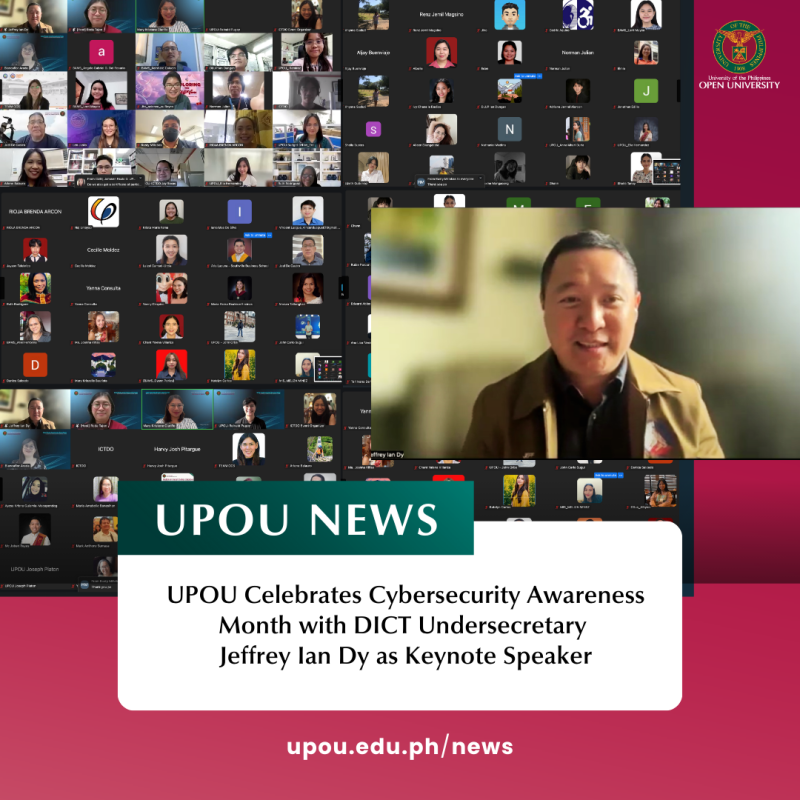
The University of the Philippines Open University (UPOU), through its Information and Communication Technology Development Office (ICTDO), hosted its Cybersecurity Awareness Month Celebration on 29 October 2024, drawing over 100 participants comprising UPOU faculty, staff, and students. The webinar, titled “CyberTiwala, CyberHanda, CyberTatag,” featured DICT Undersecretary Jeffrey Ian Dy as the keynote speaker.
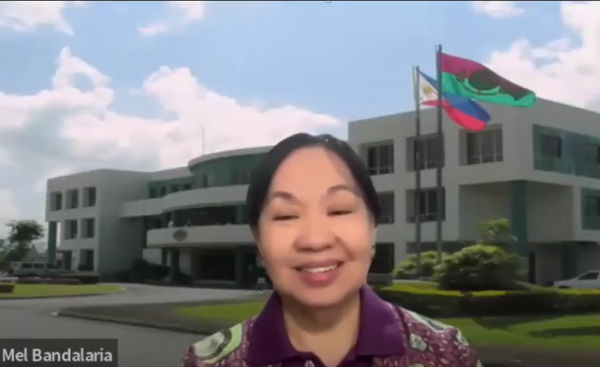
Chancellor Bandalaria shares a personal phishing experience, underscoring the need for ongoing cybersecurity education in her opening remarks.
In her opening remarks, UPOU Chancellor Melinda Bandalaria shared the recent cybersecurity drill conducted by the ICTDO. She emphasized, “Despite the warning that a cybersecurity drill will be conducted, unfortunately, some still fell into the bait and clicked the link in the email sent to everyone. This implies the need to continue informing everyone about cybersecurity.” Building on this, Chancellor Bandalaria pointed out that the ICTDO is holding this webinar to observe Cybersecurity Awareness Month and to further support ongoing efforts to protect the community from cyber disasters. She added that the webinar plays a key role in reinforcing the campaign to ensure that cyberspace remains safe and secure for all netizens, or cybercitizens.
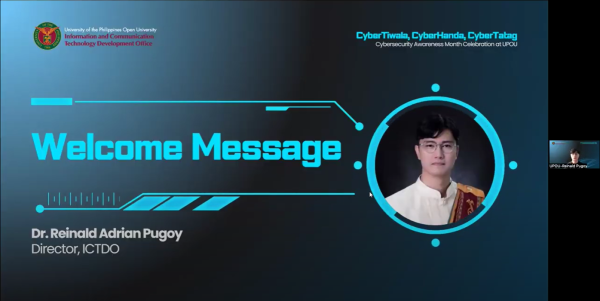
Dr. Pugoy emphasizes the necessity of cybersecurity literacy across the UPOU community in his welcome message.
Dr. Reinald Pugoy, in his welcome message, also emphasized the importance of cybersecurity, particularly within UPOU’s digital environment. He explained that since UPOU conducts courses online, it is at the forefront of the digital landscape, where every interaction, lesson, and connection happens in cyberspace. He said, “In this environment that we are standing on right now, being fluent and literate in cybersecurity is not only a valuable skill but a necessity to ensure our safety, privacy, and success.” Dr. Pugoy further noted, “We have the expectation that every member of the UPOU community—from professors to staff to students—should be cybersecurity literate. That is the dream. That is actually my dream for all of us.” He concluded with a vision where every employee and student is empowered to protect not only institutional data but personal data as well. “Imagine a world,” he said, “where at UPOU, each and every one of us understands the importance of secure passwords and phishing awareness.”

DICT Undersecretary Dy discusses the evolving cybersecurity landscape and the critical role of collaboration in combating threats in his keynote address.
To further highlight the significance of cybersecurity, the webinar featured a keynote address by Undersecretary Ian Dy of the Department of Information and Communications Technology (DICT). Undersecretary Dy, a seasoned expert in the field, shared his insights on the evolving landscape of cybersecurity and the vital role that individuals and institutions must play in securing digital spaces.
Undersecretary Dy began by highlighting the convenience brought by digitalization, such as the “QR economy,” exemplified by the Bangko Sentral ng Pilipinas’ QRPh initiative, which harmonizes bank accounts and e-wallets for seamless transactions. However, he noted that this progress also opens new avenues for cyber threats, including ransomware attacks, data breaches, and phishing scams—challenges now part of the everyday lives of Filipinos.
“The academe is particularly vulnerable,” Dy said, explaining that educational institutions are prime targets for cyber threat actors due to the vast amounts of personal data they manage. Despite this, many in the academic sector are slow to adopt robust cybersecurity measures, citing reasons such as funding limitations or a tendency to downplay the risks.
To address these vulnerabilities, Dy emphasized a multi-faceted approach:
- Education and Training. Institutions must conduct regular training sessions, integrate cybersecurity into curriculums, and consider developing degree programs focused on cybersecurity.
- Policy Development and Enforcement. Schools and organizations should establish and implement comprehensive cybersecurity policies.
- Incident Response Preparedness. An effective response model includes (1) identifying, (2) containing, (3) analyzing, (4) eradicating, (5) recovering, and (6) learning from cyber incidents.
- Continued Research and Collaboration. Collaboration within and beyond the academic community is critical to staying ahead of emerging threats.
Dy concluded with a rallying call to action during Cybersecurity Awareness Month: “This is not only about learning but about building a community. Together, we must tackle pressing issues, explore innovative solutions, and develop strategies to combat the ever-evolving cyber threats. Cybersecurity is a team sport—it cannot be won alone.”
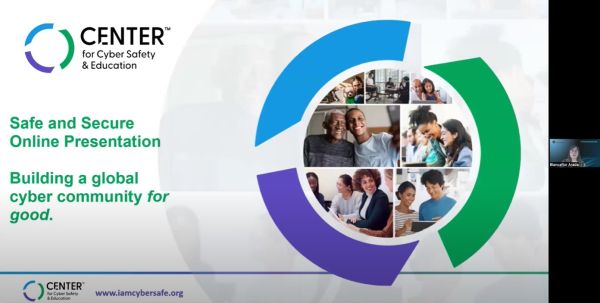
Asst. Prof. Arada provides practical tips to help individuals and institutions enhance their cybersecurity.
A practical segment of the webinar was led by Assistant Professor Blancaflor Arada, Program Chair of the Diploma in Computer Science, who shared essential cybersecurity tips and best practices to help individuals and institutions strengthen their defenses. These included advice on maintaining strong passwords, recognizing phishing attempts, ensuring software updates, and cultivating a cybersecurity-conscious mindset. As Assistant Professor Arada aptly stated, “Being cyber aware is equal to being cyber safe.”
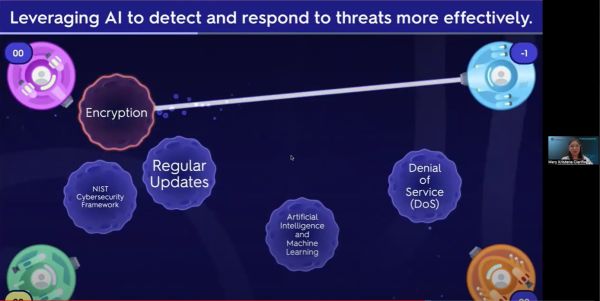
Asst. Prof. Clariño engages participants with an interactive cybersecurity game to reinforce key concepts.
In between sessions, interactive games facilitated by Assistant Professor Mary Kristene Clariño helped educate participants on key cybersecurity concepts, further engaging them in the importance of digital safety.
The UPOU community—comprising faculty, staff, and students—attended the session via Zoom, with participants receiving eCertificates. The webinar served as a vital reminder of the shared responsibility of individuals and institutions to secure the digital landscape, emphasizing that progress in digitalization must be matched with an equally strong commitment to cybersecurity.
Written by Shaira Tanay ♦ Edited by Shari Eunice San Pablo, Myra Almodiel and Anna Cañas-Llamas ♦ Contributed by the ICT Development Office








![[JOB OPPORTUNITY]
UPOU is looking for one (1) Project Staff (SG 6) under the Office of the Chancellor with the following qualifications:
- At least two years of undergraduate education
- Good communication skills
- Administrative skills
- Has knowledge of Office and Google applications
- Willing to work at the UPOU headquarters in Los Baños, Laguna
Email your CV and application letter addressed to Dr. Joane V. Serrano, Chancellor, at oc@upou.edu.ph on or before 12 February 2026.
Take this chance and be part of UPOU.
#UPOpenUniversity
#JobOpportunity
#Career](https://www.upou.edu.ph/wp-content/plugins/instagram-feed/img/placeholder.png)